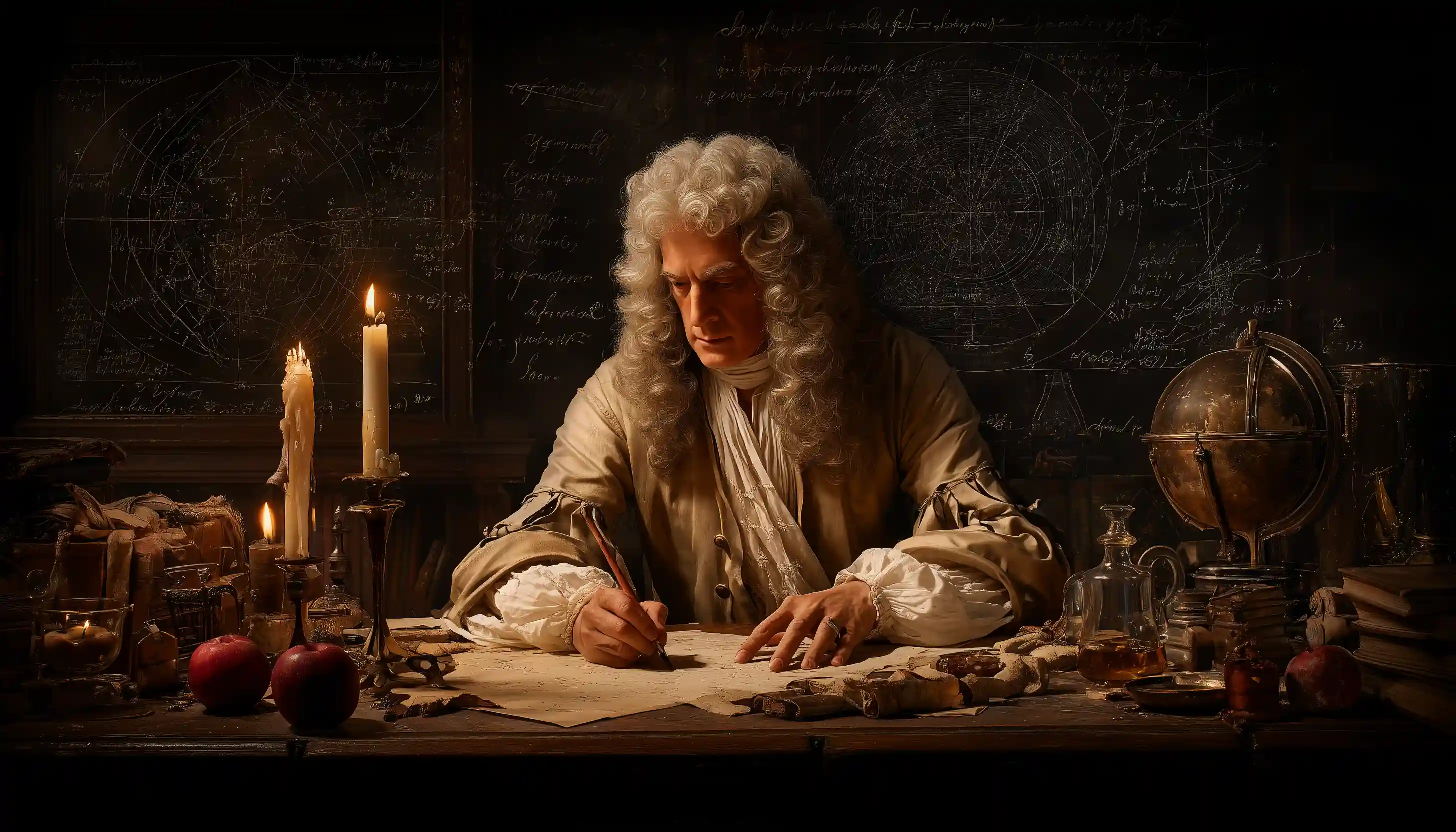How Smart Was Isaac Newton, Really? Estimating His IQ
Long before IQ tests existed, Isaac Newton’s genius reshaped science. In this article, we examine historical evidence and psychological analyses to estimate his IQ and understand what made his intellect truly exceptional.


Back
4 mins read
When people talk about the smartest humans who ever lived, Isaac Newton's name always comes up. He literally invented calculus because existing math wasn't good enough for what he was trying to prove. Then he revolutionized physics with his laws of motion and universal gravitation. Then he figured out how light and color work. All of this happened before he turned 26.
So naturally, people want to know: what was Newton's IQ?
Isaac Newton's IQ is estimated at 190. That puts him in the same ballpark as maybe five other people in recorded history. But Newton died in 1727, about 200 years before anyone invented the IQ test.
The 190 figure comes from a 1926 study by psychologist Catharine Cox, who analyzed historical records of 301 geniuses and tried to figure out what their IQ scores would have been. It's educated guesswork, but when you see what Newton actually did, the number checks out.
When adjusted for the Flynn Effect (the observed increase in IQ scores over generations), Newton's score would be approximately 168-170 in modern terms, accounting for roughly 0.32 IQ points per year increase on the Stanford-Binet from 1916 to the present.
Where That 190 IQ Score Actually Comes From

Catharine Cox wrote her Stanford dissertation on this exact question. She worked with Lewis Terman (the one who adapted the Stanford-Binet test) and a team of psychologists to analyze historical records for 301 famous people born between 1450 and 1850.
They looked at everything: when someone learned to read, school records, early achievements, anything that showed intellectual development. Then they asked what IQ a modern kid would need to do those same things at those ages.
Newton got an initial score of 170 based on his documented achievements from birth to age 17. Cox then applied a statistical correction for incomplete data and bumped it to 190. That put him in the top tier with Voltaire and Laplace, though Goethe topped everyone at 210.
People have criticized Cox's method over the years. Stephen Jay Gould pointed out that her estimates basically measured "how many pages the biography had" more than actual intelligence. Rich Western Europeans got better scores because they had better documentation. Fair point. But Cox's study is still the only serious academic attempt to estimate historical IQs, so that 190 has stuck around.
What Newton Actually Did & Hints Of His IQ Score
Forget the number. Look at the work.
1666: One Year That Rewrote Physics
Newton is 23, hiding from the plague at his family's farm. In 18 months, he invents calculus, figures out that white light contains all colors, formulates universal gravitation, and develops the math for circular motion.
At 23. During a pandemic. He revolutionized three different fields before his 25th birthday.
Physicist Louis Trenchard More said it was "the richest and most productive period ever experienced by a scientist." I can't think of anything that comes close.
He Made Up New Math Because He Needed It
Newton needed to prove his gravity theories, but existing math wasn't powerful enough. So he invented calculus. By 23, he'd mastered techniques that wouldn't be formally published for 50 years.
He developed differential and integral calculus independently. Not because someone taught him, but because he needed it to solve problems no one had touched.
Physicist Roger Penrose said Newton's geometric methods were "more concise and elegant" than the formal calculus that came later. He wasn't just solving problems. He was seeing mathematical reality differently from everyone else.
The Book That Changed Everything

1687: Newton publishes Principia Mathematica. It unified how things move on Earth and in space through universal gravitation. That framework dominated physics for 200+ years until Einstein came along (and Newton's laws still worked, they're just incomplete).
The Principia genuinely changed how we understand the universe.
Sustained Focus Nobody Could Match
Newton described his method:
"I keep the subject constantly before me, and wait 'till the first dawnings open slowly, by little and little, into a full and clear light."
When someone asked how he discovered gravity, he said:
"By thinking about it all the time."
Physicist Edward Andrade said Newton was "capable of greater sustained mental effort than any man, before or since." This wasn't just being smart. It was extreme intelligence plus obsessive focus that produced breakthroughs nobody else could reach.
Even Einstein Was Impressed
Einstein called Newton "the smartest person who ever lived and the greatest scientific mind of all time." This from a guy whose own IQ was probably around 160.
Carl Friedrich Gauss, one of the greatest mathematicians ever, used the word "summus" (supreme) for Newton alone. When geniuses call someone the ultimate genius, that means something.
Why The Number Doesn't Tell Everything

IQ tests measure pattern recognition, problem-solving, and abstract reasoning. They predict academic success decently well up to a point. But above 125-130, the link between IQ and revolutionary achievement basically vanishes.
Richard Feynman won the Nobel Prize in physics. His IQ? 125.
William Shockley and Luis Alvarez got rejected from Lewis Terman's high-IQ study as kids because they didn't score high enough. Both won Nobel Prizes later.
Meanwhile, the 1,500+ kids Terman selected for having IQs above 140? None achieved that level.
Newton wasn't special just because of a high IQ. It was exceptional math ability, plus spatial reasoning, plus obsessive focus, plus creative problem-solving, plus the guts to tackle impossible problems.
The 190 is shorthand for "this person's brain worked at the absolute edge of human capability." Whether it's precisely 190 or 180 or 200 is irrelevant. Newton transformed human knowledge in ways that still matter 300 years later.
What This Means
Newton had an IQ of around 190, based on historical records and what he accomplished. But it's a rough estimate, not a precise measurement.
When you invent new math, revolutionize physics, and change how humans understand reality (all before turning 25), you've moved past what IQ tests can measure. You're operating at a level where the numbers become meaningless.
Yeah, Newton's IQ was around 190. But the more interesting question is whether our tools for measuring genius are even good enough to capture what he actually was.


Return to Blog




